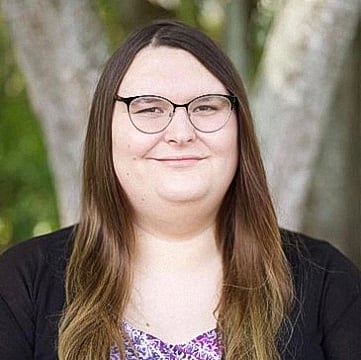
I'll never forget my undergraduate voice lessons with Dr. Loraine Sims at Louisiana State University. When I began my studies, I didn't start with Dr. Sims immediately. I worked with a graduate teaching assistant my freshman year, and in my sophomore year, I began working with the voice professor who ran the studio. His methodology didn't fit with my personality, nor did he seem super comfortable working with a bass-baritone who identified as female. After a particularly rough lesson in which my French diction was lambasted—probably rightfully so—I approached Dr. Sims to see if I could transfer into her studio.
Luckily, Dr. Sims granted my request. We began working together, addressing my common vocal issues, like my infuriating tongue, which refused to relax and stay in a more forward position, or my tendency to swallow the sound. Don't get me started on tension. Just thinking about it makes me, well...tense.
Most of the vocal issues we tackled were relatively standard issues for an undergrad until I began living authentically as female in my junior year. As Dr. Sims and I continued working together, we started running into problems that neither of us had predicted. While she was (and is) an openly LGBTQ+ identifying woman, she identified as cisgender, and I was her first transgender student. I knew that her office, located on the third floor of LSU's School of Music, was a safe place for me to exist not only as a transgender musician and student, but also as a woman who was overtly concerned with how feminine sounding her voice was/wasn't.
So Dr. Sims and I started meeting these vocal battles head-on with weapons such as her giant Hoberman sphere or fancy vocal pedagogy software. We had discussions about the highly gendered nature of singing repertoire. I found myself less interested in the traditional bass-baritone rep, most of which tended to be geared towards romantically wooing a woman in a pretty masculine way. I was more drawn to powerful feminine solos, such as Dido's Lament from Dido and Aeneas—though it didn't stop me from attempting Schubert's Der Erlkönig. Who doesn't want to sing that bop?

During my everyday life, I began raising my larynx and speaking with a higher pitch to sound more feminine. I became obsessed with ensuring my pitch was high enough and began criticizing every phrase I uttered, having philosophical and existential internal debates about if certain phrases were "feminine enough." This consistent raising of the larynx and speaking and singing in a different vocal range drained my voice quickly. I would show up to my voice lessons vocally exhausted, sometimes unable to sing at all.
Dr. Sims helped me navigate these issues. Some days became less about vocal health and more about emotional and mental health. Some lessons were spent devoting entire lessons to playing around with different songs I could potentially sing that are typically found in soprano and alto repertoire. We spent ages working on laryngeal relaxation exercises and techniques so that my voice wouldn't be so tired all of the time. These voice lessons were critical to my undergraduate success, and I use many of the same techniques with my own students, both cisgender and transgender, to help with a wide variety of vocal issues.
As you work with your transgender and non-binary singers, I'm sure some of these ideas can help you help them with any potential vocal issues they may encounter.
My number one recommendation is to work on laryngeal relaxation primarily. The fatigue that can come from using the voice differently and potentially incorrectly (especially if the singer is not working with a voice teacher, speech pathologist, or vocal therapist) is real. There are many ways to do this, but here are some of my favorites:
Yawn sighs into the chest voice
Yawn sighs usually on an [ɑ] or [jɑ] are probably my number one go-to when it comes to laryngeal relaxation. I find that sometimes after a long day with a more tense larynx, I'll feel in a rut and can't remember what a relaxed larynx feels like. A few yawn sighs help alleviate the tension and remind me of the correct feeling. I give them bonus points since they don't require a piano for accompaniment.
Brief returns into the "natural" speaking voice
To be 100% real, I find myself at odds with the idea of a "natural" speaking voice as it implies anything else is fake. Still, for ease in communication, I'm going to use that term to help delineate between speaking with a raised or lowered pitch and whatever was the "standard" voice before making the alteration.
I remember leaving lessons with Dr. Sims and feeling the same kind of vocal exhaustion as one experiences after singing a concert or teaching all day. I would go back into the privacy of my car and use these brief returns into my "natural" speaking voice to relax the larynx. This private vehicular sanctuary allowed me to use my voice where I didn't have to worry somebody would overhear, which helped minimize my own sense of dysphoria.

Vocal rest and water
Okay, I know the concept of resting your voice and drinking a lot of water isn't exactly novel, but I would be remiss if I didn't include it since the benefits of hydration and rest are unmatched. For trans and non-binary individuals, this is essential when trying to keep the voice healthy.
Semi-occluded vocal tract (SOVT) exercises
Most of us are familiar with these exercises as they are ubiquitous and beneficial for every singer. But using some of these exercises (lip trills, humming, or v's and other voice consonants, especially on descending lines) daily in warm-ups will allow your trans and non-binary singers to alleviate tension and increase relaxation. My favorite is using "V" in a descending 5-4-3-2-1 pattern.
Utilize range extension exercises
Range extension exercises can be beneficial for everybody to help strengthen the "outer edges" of the voice.
For those who are assigned male at birth (AMAB), I recommend working on developing a strong and clear head voice (note the intentional decision to avoid the word "falsetto," which I feel is falling out of favor with many vocal pedagogues). Find ways to help your singers activate the head voice healthily, gradually raising the pitch. Also, spend time focusing on singing in and out of the passaggio, or break. Over time, your singer may add higher notes into their range or, at the very least, have a better head voice.
For those who are assigned female at birth (AFAB), I recommend working on developing the chest voice while focusing on eliminating the husky or breathy sound that can sometimes be present in those lower ranges. Work the chest voice, gradually lowering the pitch, but make sure to give frequent returns to the head voice. Spending too much time exclusively in the chest voice could cause extra exhaustion.
My friend Mari Esabel Valverde (https://marivalverde.com) always reminds her trans singers and other teachers of trans singers that so often trans people get hung up on reaching certain pitches, with the underlying assumption of, "If I can just get up to this note, my voice will sound feminine" or, conversely lower for a masculine sound. However, while achieving the pitch is essential, it's equally important not to forget about developing resonance in the singing voice.
I've been fortunate enough to do many presentations and sessions across the country concerning teaching transgender singers. One of the most common worries I find teachers bring up in these different workshops is a fear of not knowing how to address vocal concerns with trans or non-binary people. I hope the aforementioned steps help you in your ensembles, but please realize there isn't a lot that is novel or super new. Most of these ideas are things you are probably already doing in your own practice. Trust in your ability to develop healthy singing practices and keep an open, ongoing dialogue with your trans and non-binary singers as you do. Listen to their needs and what they say, and adapt as needed. Be flexible and accessible. If you can do that, all of your singers will thrive.

Melanie Stapleton (she/her) is a music educator, researcher, author, and choral director located in Chicago. She is currently a PhD student at Northwestern University in Evanston, Illinois, pursuing a PhD in Music Studies with a specialization in Music Education and an interdisciplinary certificate in Gender and Sexuality Studies. She is the founder of Blurring the Binary, and holds a Masters of Music Education from the University of North Texas as well as a Bachelors of Music Education from Louisiana State University. She is a strong believer that the choral ensemble should be a musical family and a safe place offering unconditional love for all. When not teaching, she can be found hanging with her Golden Retriever, Queso, playing video games, or jamming to the latest choral hits.

